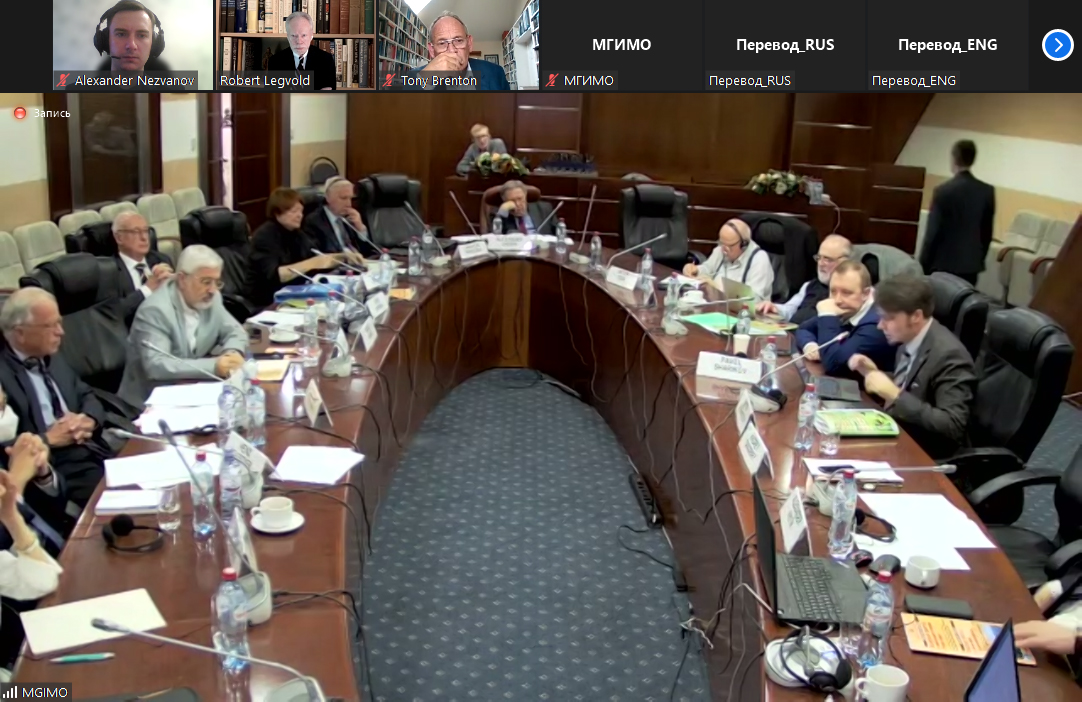JINR in solving urgent issues of our time
News, 25 October 2022
On 20 October, JINR representatives took part in an international сonference “Prevention of Nuclear War in the Context of an Arms Control Crisis” organized by Moscow State Institute of International Relations (MGIMO) .
As part of the Conference, the webinar “Communication, Ethics, and the Future of Scientific Cooperation” was held, where participants examined the role of scientists and scientific communities in building an international dialogue based on various formats of cooperation in maintaining peace. International Cooperation Advisor to JINR Director Irek Suleymanov highlighted that the dialogue was and would be the most important format of scientific cooperation. He shared the results of an online survey carried out during the discussion meeting “Science, Dialogue, and Society” as part of the informal expert science diplomacy club Dubna Green Chamber Talks. Thus, the results of the study identified the sphere of humanitarian knowledge and understanding of human civilization among the global challenges that could become points of crystallisation of scientific cooperation and unification of countries on the horizon 2030+, along with the climate agenda, space, and artificial intelligence.
On behalf of the Youth Branch of the Russian Pugwash Committee under the Presidium of the Russian Academy of Sciences, where the Association of Young Scientists and Specialists of JINR is represented, a researcher of the Laboratory of Neutron Physics and member of the AYSS Council Alexander Nezvanov made a report at the online Conference. His review report was about the impact of the rapid development of technology on the risks of escalation of tension in the world.
“The event was extremely valuable. Complex, critical issues of nuclear safety in the world were discussed. All this, of course, touched upon the topic of the current geopolitical tension. I am delighted that this international discussion was held in a positive way. Participants discussed the necessary conditions for resolving the situation. Participants discussed the potential of normalisation and what common ground exist, how and at what level it can be searched for,” Alexander Nezvanov said.
At the meeting, it was noted that in order to restore peace and strengthen it, consolidation of very many and very diverse actors is required. Here, the international scientific cooperation conducts a special mission of preserving an interstate dialogue due to the strong, fundamentally persistent professional and ideological community of academic circles of different countries.
The Conference had a broad international coverage since among its participants were experts and representatives of the diplomatic corps of Austria, Great Britain and Sweden, RAS representatives, directors of institutes of the Department of Global Problems and International Relations of RAS, professors of European and American research centres, representatives of the MGIMO Directorate, and many others.
The Joint Institute for Nuclear Research is traditionally represented in the Youth Branch of the Russian Pugwash Committee, in which the JINR youth is in charge of the area of technical sciences.
We remind that the Pugwash Conferences on Science and World Affairs have existed since 1955. The goals of this international non-governmental scientific organization are to reduce the risk of armed conflicts and search for solutions to global security threats. The Pugwash Conferences are held every two years in various countries of the world. In addition, the movement organizes thematic symposiums and seminars.
